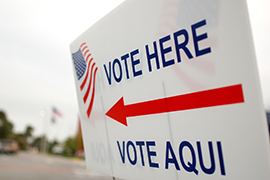- Slug: BC-CNS-Tucson Elections,540
- File photo available (thumbnail, caption below)
By KENDRA PENNINGROTH
Cronkite News
WASHINGTON – The Supreme Court on Monday declined to hear a challenge to Tucson’s hybrid system of elections for city council members, ending a two-year court battle by critics who said it unconstitutionally violates the one-person, one-vote principle.
The court, without comment, let stand a September ruling by a unanimous 9th U.S. Circuit Court of Appeals that said local governments have the flexibility to craft election systems in a manner that “permits innovation and experimentation” and can “vary greatly across the country.”
An attorney for the Arizona Public Integrity Alliance, which had challenged the Tucson system, conceded that Monday’s decision is “the end of the road for this case.”
“It’s disappointing,” said Kory Langhofer, the attorney. “We wanted to use the case to make sure everyone got to vote for their representatives in the primary election.”
Mayor Johnathan Rothschild’s office referred calls to the city attorney, who did not immediately return a request for comment.
Under Tucson’s system, candidates for city council must first be nominated during a partisan primaries from the city ward they will represent. The ward-selected party nominees then face off in a general election in which they are elected at-large, with all city voters casting ballots for open seats, regardless of the voter’s ward.
Council members are elected on a rotating basis, with three of the city’s six wards up for election every two years.
The city has used the system since adopting its current charter in 1929, twice rejecting proposals to change it. City voters rejected a plan in 1991 that would have made both primary and general elections ward-based, and in 1993 they voted against a system that would have made both primary and general elections citywide.
The Public Integrity Alliance sued in April 2015, arguing that the system for picking nominees “excludes more than 80 percent of his or her constituents” who will go to the ballot box in the general election.
A U.S. District Court judge disagreed, siding with the city. But a divided panel of the 9th Circuit reversed the district court ruling in November 2015, just days after the city election.
The appeals court panel said the city’s system gives “disproportionate weight” to voters in a council member’s home ward.
In April 2016, the full 9th Circuit agreed to consider the panel’s ruling and in September it unanimously overturned the panel and agreed with the district court.
The full court said the system “imposes no constitutionally significant burden on voters’ right to vote.” It said the city’s argument – that the system guaranteed all wards are represented on the council by members with intimate local knowledge – was a “valid, sufficiently important interest to justify” the hybrid system.
The Public Integrity Alliance’s appeal to the Supreme Court argued that letting the appeals court ruling stand “would vest in states and municipalities a nearly unfettered ability to deny the right to vote in the primary election to large swaths of a representative’s constituency solely because of their geographic location.”
But the city argued that overturning the appellate decision would run counter to the Supreme Court’s “longstanding decisions allowing states and localities to control their governmental structure, political processes and elections.” The high court appeared to agree Monday.
“The town won in the last round,” Langhofer said.
^__=
Web links:
_ 9th Circuit ruling: http://cdn.ca9.uscourts.gov/datastore/opinions/2016/09/02/15-16142.pdf
_ Public Integrity Alliance petition: http://www.scotusblog.com/wp-content/uploads/2016/12/16-730-cert-petition.pdf
_ City of Tucson response: http://www.scotusblog.com/wp-content/uploads/2017/02/16-730-BIO.pdf
^__=
The Supreme Court let stand an appeals court ruling that said Tucson’s hybrid election system – primaries by ward and general elections at-large – does not infringe on the right to vote by city residents. (Photo by Erik Hersman/Creative Commons)
